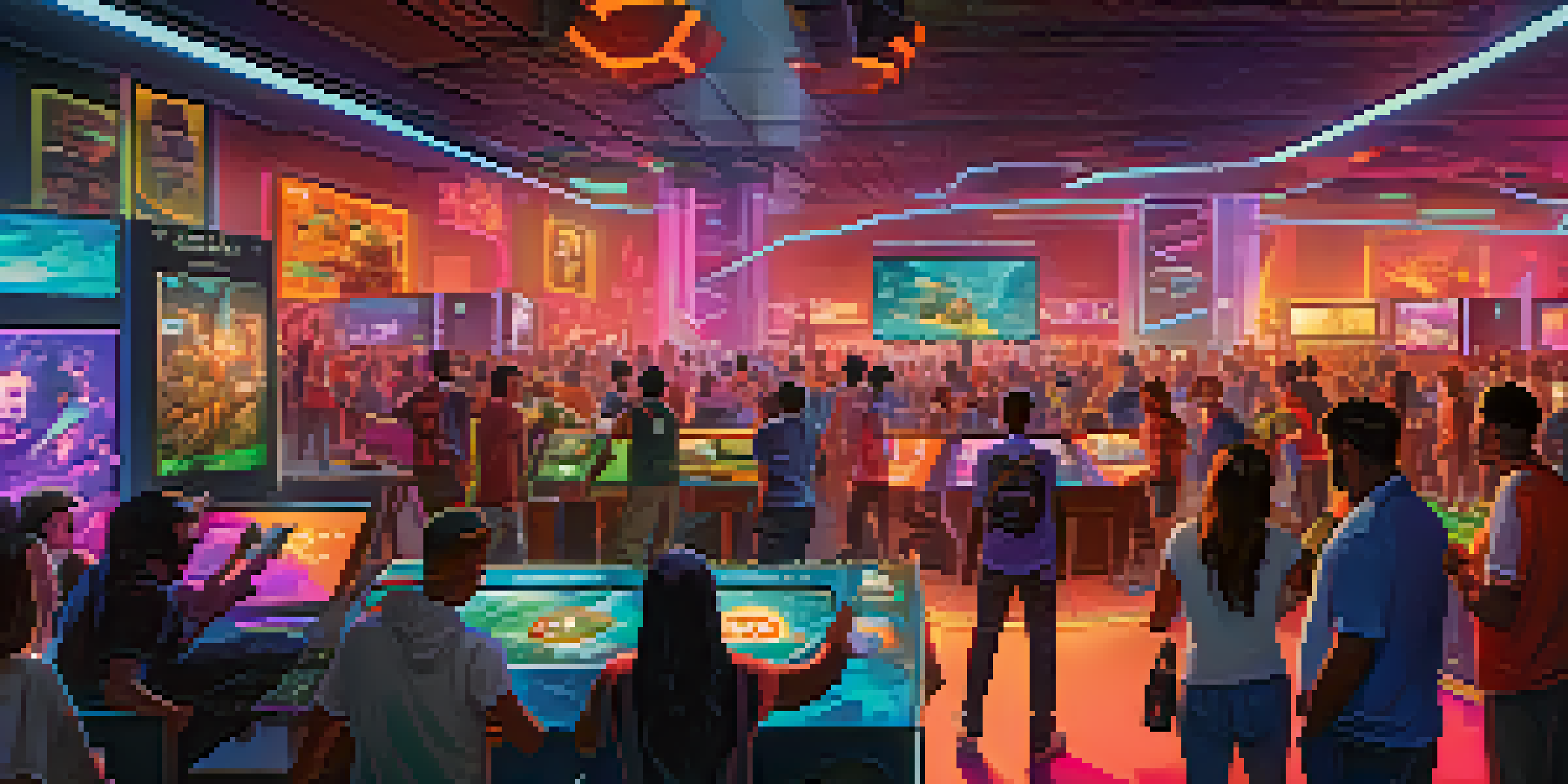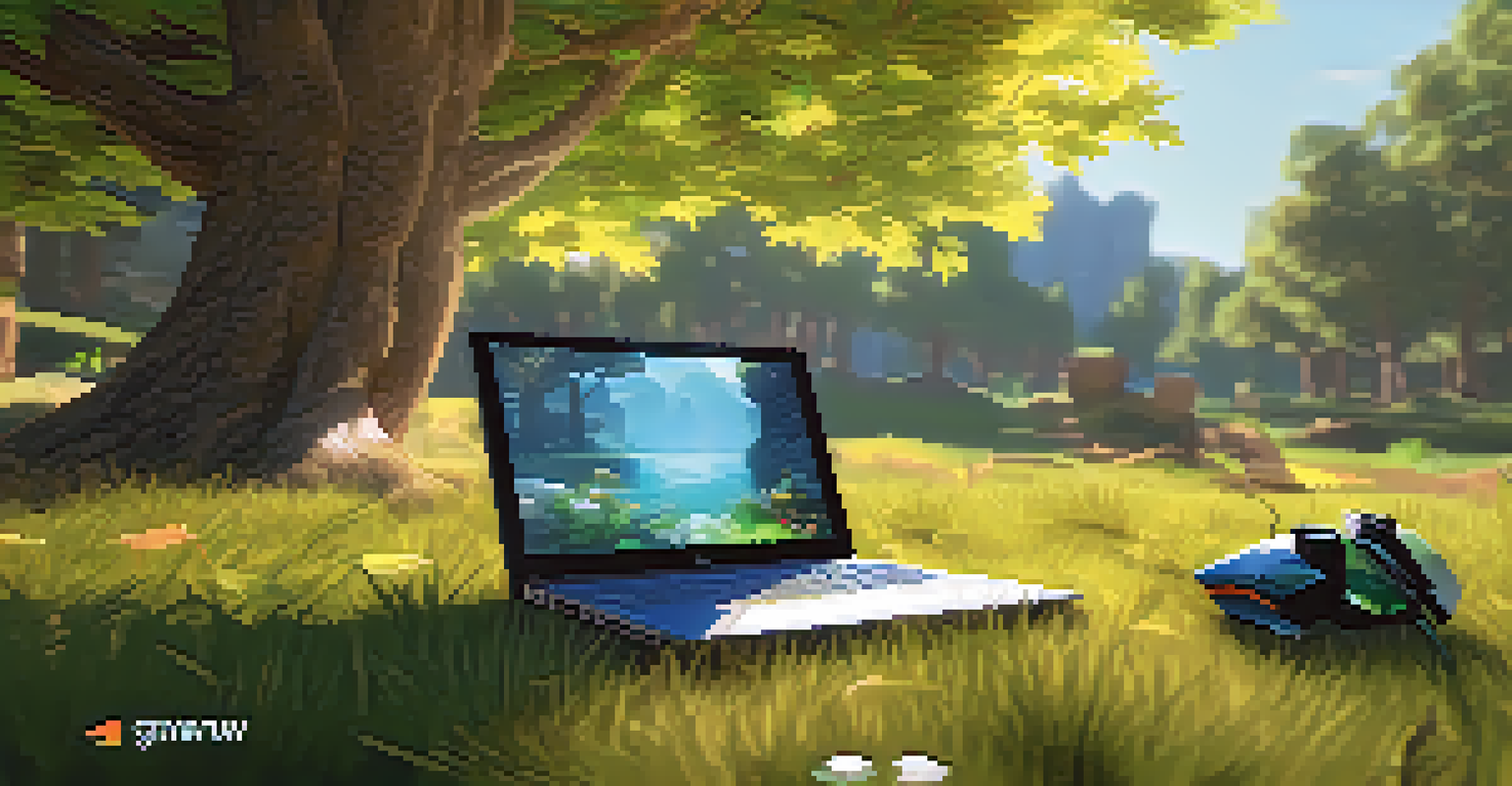Play-to-Earn: A New Era for Game Developers and Players

Understanding Play-to-Earn: The Basics
Play-to-Earn (P2E) is a revolutionary gaming model that allows players to earn real-world value through their in-game activities. Unlike traditional gaming, where players invest time and money but receive little in return, P2E flips this idea on its head. Players can earn cryptocurrency or in-game assets that have tangible value outside the game, creating a more rewarding experience. This model not only enhances player engagement but also introduces a new economic layer to gaming.
The future of gaming is not just about entertainment; it's about creating real economic opportunities for players around the world.
At its core, Play-to-Earn leverages blockchain technology to ensure transparency and security. Each item or currency earned is stored on a decentralized ledger, making it verifiable and tradable. This means players can buy, sell, or trade their assets with others, creating a dynamic marketplace. For gamers who invest their time and skills, this is a game-changer, providing them with real incentives to play.
As P2E games gain popularity, they attract a diverse audience, from casual gamers to seasoned players looking to monetize their skills. This shift is not just a trend; it's a new paradigm in the gaming industry that encourages participation and fosters community. With the right balance of gameplay and earning potential, P2E is set to redefine how we perceive gaming.
The Benefits for Game Developers
For game developers, the Play-to-Earn model opens up new revenue streams and increased player retention. By integrating earning mechanisms, developers can create more engaging and addictive experiences that keep players coming back. This model not only incentivizes gameplay but also fosters a loyal community, which is essential for long-term success in the gaming industry.

Moreover, P2E allows developers to tap into the growing interest in blockchain technology and cryptocurrencies. By incorporating these elements, they can attract a tech-savvy audience eager to explore new gaming possibilities. This appeal can lead to higher player acquisition rates and even partnerships with crypto platforms, further enhancing their visibility and credibility.
Players Earn Real Value
Play-to-Earn games allow players to convert their gaming efforts into tangible rewards, such as cryptocurrency and tradable assets.
However, developers must also navigate the challenges that come with a P2E model. Balancing the game economy to ensure fairness and sustainability is crucial, as is maintaining a high-quality gaming experience. By focusing on these aspects, developers can create games that are not only profitable but also enjoyable for players.
Player Empowerment: A New Gaming Experience
One of the most exciting aspects of Play-to-Earn is the empowerment it offers players. In traditional gaming, players often feel like they have little control over their investments, as assets can vanish with a game’s closure. P2E changes this narrative by giving players ownership of their in-game assets, which they can trade or sell as they see fit. This sense of ownership enhances the gaming experience and builds a deeper emotional connection with the game.
Play-to-Earn is revolutionizing the way we think about gaming, turning passion into profit and empowering players like never before.
Players can now view their gaming efforts as a viable source of income, allowing them to turn their passion into profit. This shift is particularly appealing in regions where traditional job opportunities may be limited. For many, P2E represents a chance to achieve financial independence through gaming, making it more than just a hobby.
Furthermore, the community aspect of P2E adds another layer of engagement. Players share strategies, collaborate on quests, and even trade assets, fostering a sense of camaraderie. The social dynamics of gaming are evolving, with players forming connections that extend beyond the virtual world.
Economic Implications of Play-to-Earn
The economic implications of the Play-to-Earn model are profound, potentially reshaping local and global economies. As players earn real money from gaming, they contribute to a new digital economy that's not bound by geographic limitations. This can create economic opportunities in regions where traditional jobs are scarce, allowing individuals to earn a living through their gaming skills.
Moreover, the influx of new players into the P2E space can stimulate demand for in-game assets, leading to the growth of virtual marketplaces. This burgeoning economy encourages innovation and entrepreneurship, as individuals seek to create and sell unique in-game items or services. The potential for profit encourages a wide range of stakeholders to engage in the gaming ecosystem, enhancing its overall health.
Developers Gain New Opportunities
The P2E model offers game developers innovative revenue streams and fosters player retention through engaging gameplay.
However, with great opportunity comes responsibility. As the P2E model continues to grow, it's essential for players, developers, and regulators to ensure that the economic systems established are fair and sustainable. This balance will be vital in fostering a thriving gaming community that benefits everyone involved.
Challenges and Criticisms of Play-to-Earn
Despite its many advantages, the Play-to-Earn model is not without challenges and criticisms. One major concern is the potential for economic disparity among players. While some may excel and earn significant income, others might struggle, leading to a divide within the gaming community. This disparity can create a perception of inequity, which may deter new players from joining the ecosystem.
Additionally, the environmental impact of blockchain technology has come under scrutiny. Many cryptocurrencies require substantial energy to mine, raising concerns about their carbon footprint. As players and developers become more environmentally conscious, finding solutions that balance profitability with sustainability will be crucial to the long-term viability of P2E.
Lastly, the regulatory landscape surrounding cryptocurrencies and P2E games is still evolving. Developers must navigate a complex web of regulations that vary by country and region. Ensuring compliance while maintaining an engaging gaming experience can be a daunting task, but it's a necessary step to legitimize the P2E space.
The Future of Play-to-Earn Gaming
Looking ahead, the future of Play-to-Earn gaming is bright, with endless possibilities for innovation and growth. As technology advances, we can expect to see more immersive and interactive gaming experiences that leverage augmented reality and virtual reality. These advancements will not only enhance gameplay but also create new avenues for earning, pushing the boundaries of what's possible in the gaming world.
Moreover, as more developers enter the P2E space, competition will drive innovation. This could lead to the creation of unique game mechanics and economic models that attract a diverse array of players. The landscape is likely to evolve rapidly, with new ideas and concepts emerging to meet the demands of a changing player base.
Economic Impact of P2E
Play-to-Earn gaming has the potential to reshape local and global economies by providing income opportunities through gaming skills.
Ultimately, the success of Play-to-Earn gaming will hinge on its ability to adapt and respond to player needs. By fostering a community-driven approach and prioritizing player experience, the P2E model can continue to thrive and redefine the future of gaming.
Conclusion: Embracing the Play-to-Earn Revolution
In conclusion, Play-to-Earn is more than just a trend; it's a transformative movement in the gaming industry. By empowering players, providing new economic opportunities, and challenging traditional gaming norms, P2E is reshaping how we interact with games. Both developers and players stand to benefit from this evolution, creating a symbiotic relationship that enhances the overall gaming experience.
As we embrace this new era, it's essential to remain mindful of the challenges that come with it. Addressing issues of equity, sustainability, and regulation will be critical in ensuring that the P2E model remains a positive force in the gaming world. By fostering a responsible and inclusive community, we can harness the potential of Play-to-Earn to benefit everyone involved.

The future of gaming is here, and it's more exciting than ever. Play-to-Earn is paving the way for innovative experiences that blur the lines between gaming and real-world economics, inviting players and developers to join this exhilarating journey.